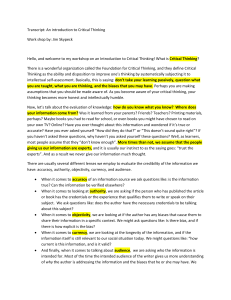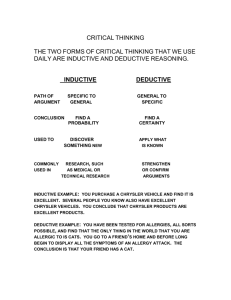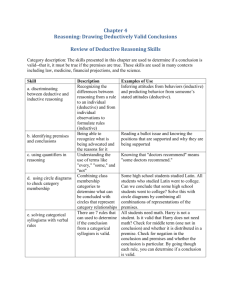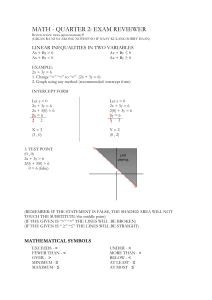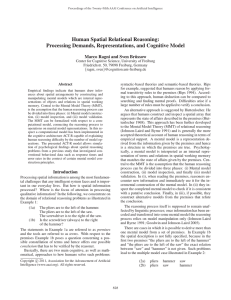Deductive reasoning and logic (2)
advertisement
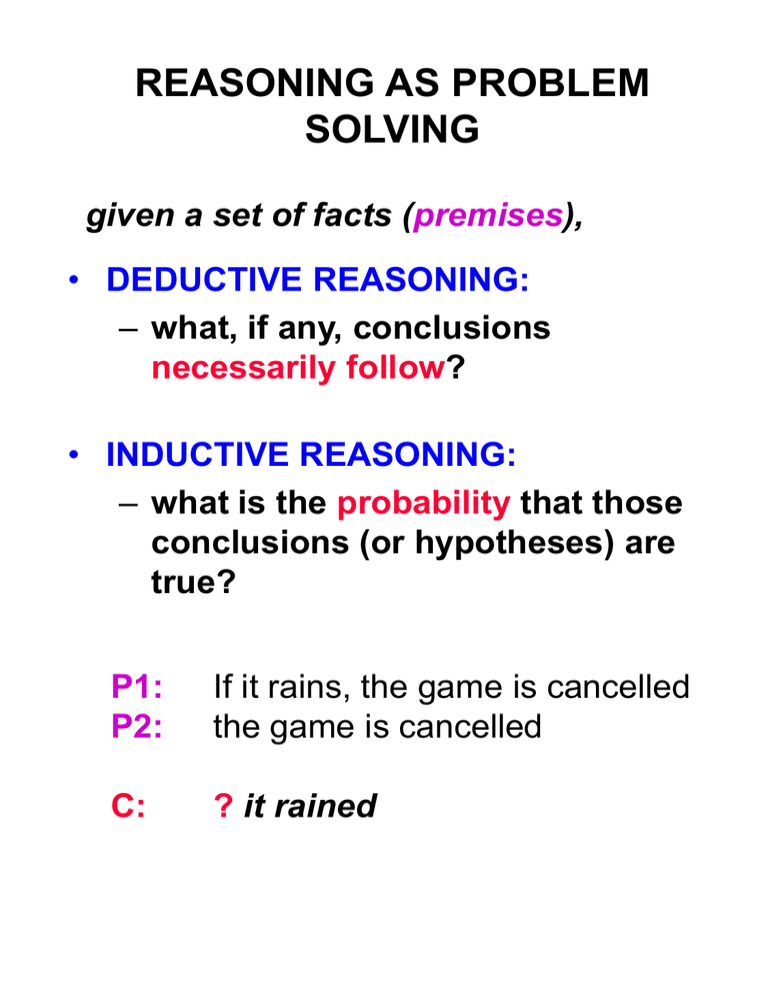
REASONING AS PROBLEM SOLVING given a set of facts (premises), • DEDUCTIVE REASONING: – what, if any, conclusions necessarily follow? • INDUCTIVE REASONING: – what is the probability that those conclusions (or hypotheses) are true? P1: P2: If it rains, the game is cancelled the game is cancelled C: ? it rained SOLVING PROBLEMS OF “LOGICAL FORM” • LOGIC is a formal system of rules of inference (algorithms) for evaluating the validity of arguments that draw conclusions from premises • REASONING is the human ability to evaluate such arguments • TWO TYPES OF LOGIC PROBLEMS: CONDITIONAL CATEGORICAL PREMISE 1 if P, then Q All A are B PREMISE 2 P is true Some B are C CONCLUSION ? Q is true ? Some A are C THE CARD SELECTION TASK (Wason & Johnson-Laird, 1977) A K 4 7 Which card(s) need to be turned over to decide if the following rule is true: “if a card has a vowel on one side, then it has an even number on the other” ? Less than 5% of college students choose the correct cards. Why? REASONING ABOUT CONDITIONAL PROBLEMS Rips & Marcus, 1977 Premise 1: if P then Q (e.g., if the chair is green, the light is on) Premise 2 P is true A P is false K Q is true 4 Q is false 7 Operation affirming the antecedent Conclusion? %Corr Q is true 100% (modus ponens) denying the antecedent ------- 79% affirming the consequent ------- 77% denying the consequent P is false (modus tolens) 57% SOURCES OF ERRORS IN CONDITIONAL REASONING • ENCODING – misinterpret the rule as “biconditional” Q if and only if P – fail to use appropriate schema “if beer is done, then 21” (Griggs & Cox, 1982) • SEARCH – fail to look for disconfirming cases (“confirmation bias”) IMPROVING PERFORMANCE IN THE CARD SELECTION TASK Platt, 1992 p e rc e n t c o rre c t • (1) Clarify rule as conditional, not biconditional • (2) Require subjects to justify choices • (3) define task as a search for violations 100 80 60 40 20 0 0 1 1&2 instructions 1,2&3 CATEGORICAL SYLLOGISMS major premise minor premise Some B’s are not A No C’s are B conclusion ? Some A’s are not C C A B argument is invalid! Conclusions must be true for all possible encodings and combinations of premises All men are mortal Socrates is a man ? All men are Socrates (W. Allen, 1975) POCKET GUIDE FOR SOLVING CATEGORICAL PROBLEMS to reject as invalid: show that premises can be combined so: All A are B Some A are not B No A are B Some A are B Some A are B No A are B Some A are not B All A are B and, since most syllogisms are invalid, when in doubt, throw it out SOURCES OF ERRORS IN CATEGORICAL REASONING • fail to make a valid inference: some B’s are A no C’s are B ? some A’s are not C 60% corr some A’s are B no B’s are C ? some A’s are not C 80% corr • make an invalid inference (illicit conversion): all A’s are B all C’s are B all B’s are C ? all A’s are C • fail to systematically search problem space: no A’s are B A B all B’s are C B C B C ? no A’s are C B C A B C A B C A BELIEF BIAS IN DEDUCTIVE REASONING all A’s are B some B’s are c ? some A’s are C All sharks are animals some animals are pets ? some sharks are pets all dogs are animals some animals are mean ? some dogs are mean all women are bad drivers all wealthy people are republicans all professors are absent minded etc etc
